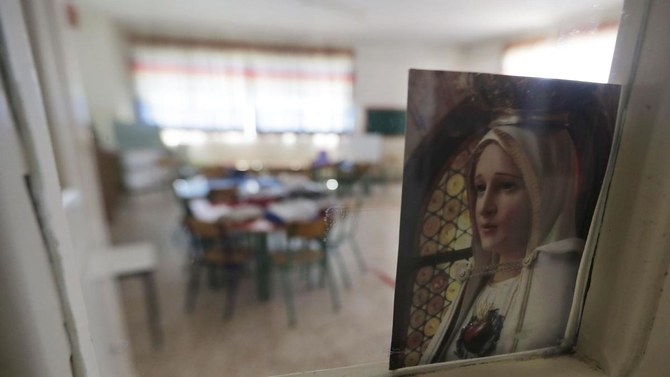BEIRUT: The French Embassy in Beirut has announced an emergency plan to provide financial support for the education of students enrolled in private French and French-speaking schools for the 2020/2021 academic year. French ambassador to Lebanon Bruno Foucher communicated this decision to the heads of schools accredited by the French Education Ministry and AEFE partners.
The announcement comes amid an unprecedented economic and political crisis in Lebanon that saw a massive decline in the value of the national currency against the US dollar.
France will channel several millions of euros to non-French families in 45 accredited schools, with a ceiling of 7,500,000 Lebanese pounds ($5,000) set for each student.
“Today, in these troubled times, France embraces Lebanon with a sister’s love, with a parent’s affection, and comes to the aid of Lebanese families who are committed to offering their children a quality French-language education,” the director of the Collège Central in Jounieh, Father Elie Saadé, told Arab News en Français.
The Agency for French Education Abroad (AEFE) has shown a strong commitment to the staff of accredited schools in terms of continuing education.
In an interview with Arab News en Français, MP Antoine Habchi, a member of the “Strong Republic” parliamentary bloc who is on the parliamentary committee for education, higher education and culture, noted that “the majority of Lebanese families are struggling and making unthinkable sacrifices to give their children the best possible education.”
“Parents can no longer afford school fees. This shows the extent of poverty and the level of destitution that Lebanon has reached in just few months. The emergency plan announced by the French Embassy provides assistance and support to accredited schools threatened with closing their doors due to the various economic and political crises. It will also prevent the entire Lebanese education system, as well as Lebanon, from collapsing as it cannot provide proper education to many of its children,” explained Habchi.
He said that “the emergency plan creates a glimmer of hope. It is a living embodiment of the Francophone spirit. In Lebanese schools, where the main language is French, the legacy of Molière's language has allowed generations of Lebanese students to open their eyes to the world and develop a critical thinking. They are used to a culture and a teaching method based on reflexivity, analysis, and the development of cross-cutting skills ... Uprooting them from these schools would have had a negative impact on their learning process.”
Habchi said that “the emergency plan came as a response to a crisis, following our communication of the need for immediate action. However, the problem should be solved structurally through the fight against corruption and law enforcement. There is also a need for the application of the reforms advocated by the Cedar Conference and the World Bank.”
Asked about the economic and health challenges in the 2020-2021 academic year, Habchi said: “The vote on the Digital Education Act will be a very important step for higher education in Lebanon; a step that would reassure students that their degree is valid. Similarly, in the short term, distance learning and online evaluations took place during the coronavirus crisis. A bill would legislate what has been done in the academic context. As far as schools are concerned, the committee should prepare for the start of the school year and have proposals for blended learning. Training teachers in state schools is also a priority,” he says.
“40,000 students are expected to join state schools next year as their parents can no longer afford sending them to private ones,” Habchi said. “Lebanon’s economic crisis has seen many Lebanese lose their jobs or take pay cuts, forcing many families to remove their children from private schools during the 2019/2020 academic year, way before the COVID-19 outbreak.
“In a sign of the financial distress of Lebanese families, 39,189 students transferred during the school year from private to state schools, according to data provided by the Ministry of Education on January 20. This represents an increase of more than 15 percent compared to the 260,000 Lebanese children registered at the beginning of September. It is estimated that 30 percent of students will leave the private schools to join state schools for the 2020/2021 academic year.”
“Already under-equipped and over-crowded, state schools are not prepared for such an added burden. These schools have welcomed hundreds of thousands of Syrian refugee children who fled the war in the country next door in 2011, increasing the number of non-Lebanese students from 3,000 to 210,000, almost as many as Lebanese students. To cope with this unprecedented influx, state schools opened their doors in the afternoon to receive new foreign students,” said Habchi.
He concluded that “the unequal distribution of state schools on Lebanese territory is also a big problem. This whole context jeopardizes the school life of students who are at risk of dropping out of school, either due to their inability to pay for schooling in the private sector, or their inability to be accommodated in the public sector.”
















